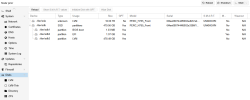Hello everyone. I have 3 Proxmox Nodes connected to an HP MSA 1040 storage. These 3 Nodes are in a cluster and can normally see the 4 LUNs of the storage. However, a new Dell PowerEdge R550 server was purchased, and I added this new server to the existing cluster. But the new Node cannot access the storage LUNs, as you can see in the screenshot below:
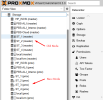
I will show below some checks I have already performed.
The
The
The
The
The
The
The
The
The
The
The
The
Additional information: the Storage IP addresses are:
- 172.16.0.101
- 172.16.0.102
- 172.16.0.103
- 172.16.0.104
The IP address of the old Node that accesses the Storage is 172.16.0.11.
The IP address of the new Node that cannot access the Storage is 172.16.0.17. This new Node can successfully ping all 4 Storage IP addresses:
The permissions within the HP MSA 1040 Storage are correctly granted, in the same way they were applied to the other Nodes in the Cluster:
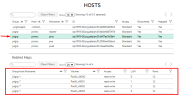
Within Proxmox, the permissions for the new Node were also granted for the 4 LUN units:
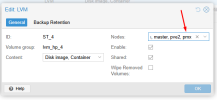
I don't know what else I can do, the storage units are not recognized on the new Proxmox Node:
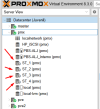
Can anyone help me? I would greatly appreciate it if you could help me solve this issue.

I will show below some checks I have already performed.
The
/etc/pve/storage.cfg file from the new Node that cannot access the Storage:
Code:
root@pmx:~# cat /etc/pve/storage.cfg
dir: local
path /var/lib/vz
content vztmpl,iso
prune-backups keep-last=1
shared 1
lvmthin: local-lvm
thinpool data
vgname pve
content images,rootdir
iscsi: HP_iSCSI
portal 172.16.0.101
target iqn.1986-03.com.hp:storage.msa1040.14471ea67b
content images
nodes pve2,master,pve,pmx
lvm: ST_1
vgname lvm_hp
base HP_iSCSI:0.0.3.scsi-SHP_MSA_1040_SAN_00c0ff25ba360000e611ba5c01000000
content rootdir,images
nodes pve2,master,pve,pmx
saferemove 0
shared 1
lvm: ST_2
vgname lvm_hp_2
base HP_iSCSI:0.0.1.scsi-SHP_MSA_1040_SAN_00c0ff25ba360000da3bf95502000000
content rootdir,images
nodes pmx,pve2,master,pve
saferemove 0
shared 1
lvm: ST_3
vgname lvm_hp_3
base HP_iSCSI:0.0.2.scsi-SHP_MSA_1040_SAN_00c0ff25ba360000db3bf95501000000
content rootdir,images
nodes master,pve,pve2,pmx
saferemove 0
shared 1
lvm: ST_4
vgname lvm_hp_4
base HP_iSCSI:0.0.0.scsi-SHP_MSA_1040_SAN_00c0ff25ba360000da3bf95501000000
content images,rootdir
nodes pmx,pve2,pve,master
saferemove 0
shared 1
pbs: PBS-Cloud
datastore ALJ
server proxmox.rstech.solutions
content backup
fingerprint f3:1c:7b:b1:7c:c1:2e:c4:89:a3:91:4e:61:a7:e4:9f:0e:72:ac:38:10:e9:c0:8c:ae:65:8b:bd:8c:5f:06:bc
nodes pve2,master,pve
prune-backups keep-all=1
username backup_alj@pbs
pbs: PBS-ALJ_interno
datastore backup_interno
server 192.168.0.21
content backup
fingerprint 1f:53:a4:7c:e6:3d:7e:ec:e6:ec:6a:06:9a:e5:4c:b2:42:a1:ec:2d:d7:a3:46:be:2b:25:96:8c:ea:7d:c9:d8
prune-backups keep-all=1
username backup_alj@pbs
pbs: PBS-ALJ
datastore backup3
server 192.168.0.21
content backup
fingerprint 1f:53:a4:7c:e6:3d:7e:ec:e6:ec:6a:06:9a:e5:4c:b2:42:a1:ec:2d:d7:a3:46:be:2b:25:96:8c:ea:7d:c9:d8
prune-backups keep-all=1
username backup_alj@pbsThe
/etc/pve/storage.cfg file from the old Node that accesses the Storage normally:
Code:
root@master:~# cat /etc/pve/storage.cfg
dir: local
path /var/lib/vz
content vztmpl,iso
prune-backups keep-last=1
shared 1
lvmthin: local-lvm
thinpool data
vgname pve
content images,rootdir
iscsi: HP_iSCSI
portal 172.16.0.101
target iqn.1986-03.com.hp:storage.msa1040.14471ea67b
content images
nodes pve2,master,pve,pmx
lvm: ST_1
vgname lvm_hp
base HP_iSCSI:0.0.3.scsi-SHP_MSA_1040_SAN_00c0ff25ba360000e611ba5c01000000
content rootdir,images
nodes pve2,master,pve,pmx
saferemove 0
shared 1
lvm: ST_2
vgname lvm_hp_2
base HP_iSCSI:0.0.1.scsi-SHP_MSA_1040_SAN_00c0ff25ba360000da3bf95502000000
content rootdir,images
nodes pmx,pve2,master,pve
saferemove 0
shared 1
lvm: ST_3
vgname lvm_hp_3
base HP_iSCSI:0.0.2.scsi-SHP_MSA_1040_SAN_00c0ff25ba360000db3bf95501000000
content rootdir,images
nodes master,pve,pve2,pmx
saferemove 0
shared 1
lvm: ST_4
vgname lvm_hp_4
base HP_iSCSI:0.0.0.scsi-SHP_MSA_1040_SAN_00c0ff25ba360000da3bf95501000000
content images,rootdir
nodes pmx,pve2,pve,master
saferemove 0
shared 1
pbs: PBS-Cloud
datastore ALJ
server proxmox.rstech.solutions
content backup
fingerprint f3:1c:7b:b1:7c:c1:2e:c4:89:a3:91:4e:61:a7:e4:9f:0e:72:ac:38:10:e9:c0:8c:ae:65:8b:bd:8c:5f:06:bc
nodes pve2,master,pve
prune-backups keep-all=1
username backup_alj@pbs
pbs: PBS-ALJ_interno
datastore backup_interno
server 192.168.0.21
content backup
fingerprint 1f:53:a4:7c:e6:3d:7e:ec:e6:ec:6a:06:9a:e5:4c:b2:42:a1:ec:2d:d7:a3:46:be:2b:25:96:8c:ea:7d:c9:d8
prune-backups keep-all=1
username backup_alj@pbs
pbs: PBS-ALJ
datastore backup3
server 192.168.0.21
content backup
fingerprint 1f:53:a4:7c:e6:3d:7e:ec:e6:ec:6a:06:9a:e5:4c:b2:42:a1:ec:2d:d7:a3:46:be:2b:25:96:8c:ea:7d:c9:d8
prune-backups keep-all=1
username backup_alj@pbsThe
pvesm status command from the new Node that cannot access the Storage:
Code:
root@pmx:~# pvesm status
Name Type Status Total Used Available %
HP_iSCSI iscsi active 0 0 0 0.00%
PBS-ALJ pbs active 7751272176 4143885528 3216668988 53.46%
PBS-ALJ_interno pbs active 1900570232 1369699328 434253432 72.07%
PBS-Cloud pbs disabled 0 0 0 N/A
ST_1 lvm inactive 0 0 0 0.00%
ST_2 lvm inactive 0 0 0 0.00%
ST_3 lvm inactive 0 0 0 0.00%
ST_4 lvm inactive 0 0 0 0.00%
local dir active 98497780 8338656 85109576 8.47%
local-lvm lvmthin active 334610432 0 334610432 0.00%The
pvesm status command from the old Node that accesses the Storage normally:
Code:
Name Type Status Total Used Available %
HP_iSCSI iscsi active 0 0 0 0.00%
PBS-ALJ pbs active 7751272176 4143885528 3216668988 53.46%
PBS-ALJ_interno pbs active 1900570232 1369699356 434253404 72.07%
PBS-Cloud pbs active 5813177436 5116112340 404022636 88.01%
ST_1 lvm active 1946771456 1625292800 321478656 83.49%
ST_2 lvm active 1953120256 1887436800 65683456 96.64%
ST_3 lvm active 1953120256 1205862400 747257856 61.74%
ST_4 lvm active 1953120256 1807745024 145375232 92.56%
local dir active 98559220 33138412 60371260 33.62%
local-lvm lvmthin active 392933376 0 392933376 0.00%The
iscsiadm -m node command from the new Node that cannot access the Storage:
Code:
root@pmx:~# iscsiadm -m node
172.16.0.101:3260,1 iqn.1986-03.com.hp:storage.msa1040.14471ea67b
172.16.0.102:3260,3 iqn.1986-03.com.hp:storage.msa1040.14471ea67b
172.16.0.103:3260,2 iqn.1986-03.com.hp:storage.msa1040.14471ea67b
172.16.0.104:3260,4 iqn.1986-03.com.hp:storage.msa1040.14471ea67bThe
iscsiadm -m node command from the old Node that accesses the Storage normally:
Code:
root@master:~# iscsiadm -m node
192.168.0.33:3260,1 iqn.1992-04.com.emc:storage.vmstor.stjvl-1
192.168.0.33:3260,1 iqn.1992-04.com.emc:storage.vmstor.stjvl-3
192.168.0.33:3260,1 iqn.1992-04.com.emc:storage.vmstor.stjvl-2
192.168.0.31:3260,1 iqn.2012-07.com.lenovoemc:storage.ix4-300d.st-emc
172.16.0.31:3260,1 iqn.2012-07.com.lenovoemc:storage.ix4-300d.st-emc
192.168.1.252:3260,3 iqn.1986-03.com.hp:storage.msa1040.14471ea67b
192.168.1.253:3260,2 iqn.1986-03.com.hp:storage.msa1040.14471ea67b
172.16.0.102:3260,3 iqn.1986-03.com.hp:storage.msa1040.14471ea67b
192.168.0.243:3260,2 iqn.1986-03.com.hp:storage.msa1040.14471ea67b
192.168.0.245:3260,1 iqn.1986-03.com.hp:storage.msa1040.14471ea67b
192.168.0.244:3260,4 iqn.1986-03.com.hp:storage.msa1040.14471ea67b
192.168.0.232:3260,3 iqn.1986-03.com.hp:storage.msa1040.14471ea67b
172.16.0.3:3260,2 iqn.1986-03.com.hp:storage.msa1040.14471ea67b
192.168.1.251:3260,1 iqn.1986-03.com.hp:storage.msa1040.14471ea67b
192.168.0.233:3260,2 iqn.1986-03.com.hp:storage.msa1040.14471ea67b
192.168.1.254:3260,4 iqn.1986-03.com.hp:storage.msa1040.14471ea67b
172.16.0.104:3260,4 iqn.1986-03.com.hp:storage.msa1040.14471ea67b
192.168.0.234:3260,4 iqn.1986-03.com.hp:storage.msa1040.14471ea67b
172.16.0.101:3260,1 iqn.1986-03.com.hp:storage.msa1040.14471ea67b
172.16.0.4:3260,4 iqn.1986-03.com.hp:storage.msa1040.14471ea67b
192.168.0.231:3260,1 iqn.1986-03.com.hp:storage.msa1040.14471ea67b
172.16.0.2:3260,3 iqn.1986-03.com.hp:storage.msa1040.14471ea67b
192.168.0.246:3260,3 iqn.1986-03.com.hp:storage.msa1040.14471ea67b
172.16.0.103:3260,2 iqn.1986-03.com.hp:storage.msa1040.14471ea67b
172.16.0.1:3260,1 iqn.1986-03.com.hp:storage.msa1040.14471ea67bThe
iscsiadm -m session command from the new Node that cannot access the Storage:
Code:
root@pmx:~# iscsiadm -m session
tcp: [1] 172.16.0.104:3260,4 iqn.1986-03.com.hp:storage.msa1040.14471ea67b (non-flash)
tcp: [2] 172.16.0.101:3260,1 iqn.1986-03.com.hp:storage.msa1040.14471ea67b (non-flash)
tcp: [3] 172.16.0.102:3260,3 iqn.1986-03.com.hp:storage.msa1040.14471ea67b (non-flash)
tcp: [4] 172.16.0.103:3260,2 iqn.1986-03.com.hp:storage.msa1040.14471ea67b (non-flash)The
iscsiadm -m session command from the old Node that accesses the Storage normally:
Code:
root@master:~# iscsiadm -m session
tcp: [3] 172.16.0.101:3260,1 iqn.1986-03.com.hp:storage.msa1040.14471ea67b (non-flash)The
pvesm list [iscsi_storage_name] command from the new Node that cannot access the Storage:
Code:
root@pmx:~# pvesm list ST_1
Volid Format Type Size VMID
root@pmx:~# pvesm list ST_2
Volid Format Type Size VMID
root@pmx:~# pvesm list ST_3
Volid Format Type Size VMID
root@pmx:~# pvesm list ST_4
Volid Format Type Size VMIDThe
pvesm list [iscsi_storage_name] command from the old Node that accesses the Storage normally:
Code:
root@master:~# pvesm list ST_1
Volid Format Type Size VMID
ST_1:vm-106-disk-0 raw images 161061273600 106
ST_1:vm-106-disk-1 raw images 644245094400 106
ST_1:vm-108-disk-0 raw images 429496729600 108
ST_1:vm-110-disk-0 raw images 322122547200 110
ST_1:vm-111-disk-0 raw images 107374182400 111
root@master:~# pvesm list ST_2
Volid Format Type Size VMID
ST_2:vm-104-disk-0 raw images 214748364800 104
ST_2:vm-112-disk-0 raw images 644245094400 112
ST_2:vm-114-disk-0 raw images 107374182400 114
ST_2:vm-203-disk-0 raw images 536870912000 203
ST_2:vm-204-disk-0 raw images 214748364800 204
ST_2:vm-212-disk-0 raw images 214748364800 212
root@master:~# pvesm list ST_3
Volid Format Type Size VMID
ST_3:vm-105-disk-0 raw images 644245094400 105
ST_3:vm-105-disk-1 raw images 214748364800 105
ST_3:vm-107-disk-0 raw rootdir 53687091200 107
ST_3:vm-113-disk-0 raw images 214748364800 113
ST_3:vm-113-disk-1 raw images 107374182400 113
root@master:~# pvesm list ST_4
Volid Format Type Size VMID
ST_4:vm-100-disk-0 raw images 214748364800 100
ST_4:vm-101-disk-0 raw images 214748364800 101
ST_4:vm-109-disk-0 raw images 1099511627776 109
ST_4:vm-213-disk-0 raw images 214748364800 213
ST_4:vm-213-disk-1 raw images 107374182400 213The
pvscan command on the new Node that cannot access the Storage:
Code:
root@pmx:~# pvscan
PV /dev/sdb3 VG pve lvm2 [445.62 GiB / 16.00 GiB free]
PV /dev/sda VG local-vd1 lvm2 [14.55 TiB / 14.55 TiB free]
Total: 2 [<14.99 TiB] / in use: 2 [<14.99 TiB] / in no VG: 0 [0 ]The
pvscan command on the old Node that accesses the Storage normally:
Code:
root@master:~# pvscan
PV /dev/sdp VG lvm_hp lvm2 [1.81 TiB / <306.59 GiB free]
PV /dev/sdn VG lvm_hp_3 lvm2 [<1.82 TiB / 712.64 GiB free]
PV /dev/sdk VG lvm_hp_2 lvm2 [<1.82 TiB / 62.64 GiB free]
PV /dev/sdd VG lvm_hp_4 lvm2 [<1.82 TiB / 138.64 GiB free]
PV /dev/sda3 VG pve lvm2 [<558.38 GiB / <16.00 GiB free]
Total: 5 [<7.82 TiB] / in use: 5 [<7.82 TiB] / in no VG: 0 [0 ]Additional information: the Storage IP addresses are:
- 172.16.0.101
- 172.16.0.102
- 172.16.0.103
- 172.16.0.104
The IP address of the old Node that accesses the Storage is 172.16.0.11.
The IP address of the new Node that cannot access the Storage is 172.16.0.17. This new Node can successfully ping all 4 Storage IP addresses:
Code:
root@pmx:~# ping 172.16.0.101
PING 172.16.0.101 (172.16.0.101) 56(84) bytes of data.
64 bytes from 172.16.0.101: icmp_seq=1 ttl=64 time=0.407 ms
64 bytes from 172.16.0.101: icmp_seq=2 ttl=64 time=0.313 ms
64 bytes from 172.16.0.101: icmp_seq=3 ttl=64 time=0.294 ms
64 bytes from 172.16.0.101: icmp_seq=4 ttl=64 time=0.295 ms
64 bytes from 172.16.0.101: icmp_seq=5 ttl=64 time=0.316 ms
^C
--- 172.16.0.101 ping statistics ---
5 packets transmitted, 5 received, 0% packet loss, time 4088ms
rtt min/avg/max/mdev = 0.294/0.325/0.407/0.041 msThe permissions within the HP MSA 1040 Storage are correctly granted, in the same way they were applied to the other Nodes in the Cluster:

Within Proxmox, the permissions for the new Node were also granted for the 4 LUN units:

I don't know what else I can do, the storage units are not recognized on the new Proxmox Node:

Can anyone help me? I would greatly appreciate it if you could help me solve this issue.


